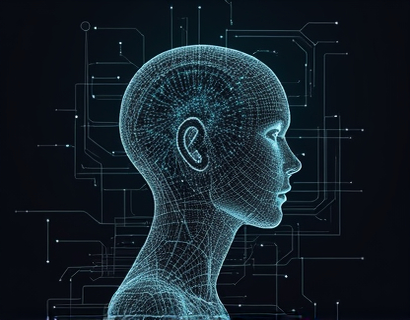AI-Generated Podcasts: Elevating Audio Experiences with Intelligent Content Creation
In recent years, the landscape of audio entertainment has undergone a significant transformation, thanks to the integration of artificial intelligence in content creation. AI-generated podcasts are at the forefront of this revolution, merging advanced technology with creative storytelling to deliver immersive and engaging content. This shift is not just about automating the production process but about redefining how listeners engage with audio content and discover insightful discussions on any topic.
The concept of AI-generated podcasts involves using machine learning algorithms to create scripts, voiceovers, and even music, all tailored to specific themes or topics. These podcasts can range from in-depth interviews and educational series to fiction narratives and comedy shows. The key advantage lies in the ability to produce high-quality content at scale, without the need for extensive human intervention. This has opened up new possibilities for content creators and listeners alike.
Technological Foundations of AI-Generated Podcasts
The foundation of AI-generated podcasts is built on several advanced technologies. Natural Language Processing (NLP) plays a crucial role in generating coherent and contextually relevant text. NLP algorithms can analyze vast amounts of data to understand language patterns, idioms, and nuances, enabling the creation of scripts that sound natural and engaging. This technology is further enhanced by Generative Adversarial Networks (GANs), which can produce high-quality audio by learning from existing podcasts and other audio sources.
Another critical component is the use of voice synthesis technology, such as WaveNet and Tacotron, which can convert text into lifelike speech. These systems can mimic different voices and accents, adding a layer of personalization and authenticity to the podcasts. Additionally, machine learning models can compose original music and sound effects, ensuring that each episode has a unique auditory experience.
Enhancing Listener Engagement
One of the most significant impacts of AI-generated podcasts is the enhancement of listener engagement. Traditional podcasts often rely on a fixed format and script, which can sometimes lead to repetitive and less engaging content. AI-generated podcasts, on the other hand, can adapt and evolve based on listener feedback and preferences. By analyzing listening patterns and preferences, these podcasts can dynamically adjust their content to keep audiences hooked.
Interactive elements are also becoming more prevalent in AI-generated podcasts. Listeners can influence the direction of the story or the topics discussed through real-time polls and feedback mechanisms. This interactivity not only increases engagement but also fosters a sense of community among listeners, who can share their thoughts and opinions in real-time.
Content Discovery and Personalization
The discovery of insightful discussions has been greatly improved with the advent of AI-generated podcasts. Traditional podcast platforms often struggle with content discovery, as users must sift through countless episodes to find something of interest. AI algorithms can analyze user preferences and recommend podcasts that align with their interests, making the discovery process more efficient and personalized.
Moreover, AI can curate playlists based on mood, topic, and even the listener's current location and time of day. For instance, a user looking for a relaxing podcast in the evening might be presented with a soothing narrative or a calming conversation, tailored to their specific preferences. This level of personalization not only enhances the listening experience but also increases user retention and satisfaction.
Creating Unique Audio Experiences
AI-generated podcasts offer a level of creativity and uniqueness that is hard to achieve with traditional production methods. The ability to generate original content on demand means that podcasters can explore a wide range of topics and formats without the constraints of time and resources. This has led to the emergence of niche podcasts that cater to specific interests, from deep dives into scientific research to immersive fiction experiences.
Furthermore, AI can assist in the post-production process, automating tasks such as editing, mixing, and mastering. This not only saves time but also ensures a consistent quality across episodes. The use of AI in content creation also allows for the experimentation with new storytelling techniques, such as branching narratives and multi-perspective storytelling, providing listeners with a more dynamic and engaging experience.
Challenges and Ethical Considerations
Despite the numerous benefits, the rise of AI-generated podcasts is not without challenges and ethical considerations. One of the primary concerns is the potential for misinformation and the blurring of lines between authentic and generated content. Ensuring transparency is crucial, as listeners should be aware when they are consuming AI-generated content. Podcast creators must adhere to ethical standards and provide clear disclaimers to maintain trust with their audience.
Another challenge is the risk of homogenization, where the reliance on algorithms might lead to a lack of diversity in content and perspectives. It is essential for creators to balance AI-generated content with human curation to maintain a rich and varied listening experience. Additionally, the use of AI in voice synthesis raises questions about authenticity and the potential for deepfakes, which must be addressed through robust ethical guidelines and technical safeguards.
The Future of Podcasting
The future of podcasting is intrinsically linked to the continued development and integration of AI technologies. As AI becomes more sophisticated, we can expect even more advanced and personalized audio experiences. The combination of AI and human creativity will likely lead to new forms of storytelling and content delivery, pushing the boundaries of what is possible in audio entertainment.
For creators, the opportunities are vast. AI tools can streamline the production process, allowing more independent creators to produce high-quality content. This democratization of podcast production can lead to a more diverse and vibrant podcast ecosystem, where a wider range of voices and stories are heard.
For listeners, the future holds the promise of more engaging, personalized, and immersive audio experiences. Whether it's through interactive storytelling, real-time feedback, or curated content, AI-generated podcasts are set to transform how we consume and interact with audio content.
In conclusion, AI-generated podcasts are not just a technological novelty but a significant evolution in the way we create and consume audio content. By leveraging the power of AI, the podcasting industry is poised to offer more engaging, personalized, and innovative experiences, redefining the landscape of audio entertainment.










































